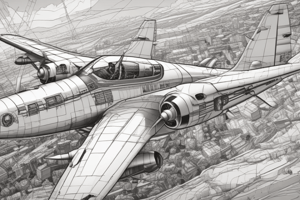Podcast
Questions and Answers
What is one of the properties mentioned in the Physics of the Atmosphere section?
What is one of the properties mentioned in the Physics of the Atmosphere section?
- Temperature (correct)
- Weight
- Lift
- Thrust
What equation represents the conservation of mass in aerodynamics?
What equation represents the conservation of mass in aerodynamics?
The Continuity Equation
Bernoulli's Equation is used in the generation of lift.
Bernoulli's Equation is used in the generation of lift.
True (A)
Stalling is a phenomenon where the airflow over the wing is disrupted, leading to loss of ____________.
Stalling is a phenomenon where the airflow over the wing is disrupted, leading to loss of ____________.
Match the aerodynamic control device with its description:
Match the aerodynamic control device with its description:
What is the composition of the Earth's atmosphere?
What is the composition of the Earth's atmosphere?
What is the main layer of the atmosphere where weather forms such as clouds, rain, and snow are found?
What is the main layer of the atmosphere where weather forms such as clouds, rain, and snow are found?
______ is called the upper limit of the Troposphere where the temperature stops decreasing.
______ is called the upper limit of the Troposphere where the temperature stops decreasing.
Pressure is the ratio of force applied to the surface area.
Pressure is the ratio of force applied to the surface area.
Match the pressure measurement unit with its description:
Match the pressure measurement unit with its description:
What is the standard atmospheric pressure at sea level in pascals?
What is the standard atmospheric pressure at sea level in pascals?
What is the ICAO Standard Temperature at sea level?
What is the ICAO Standard Temperature at sea level?
Define viscosity in the context of aerodynamics.
Define viscosity in the context of aerodynamics.
What are the common systems of measuring pressure used in aviation?
What are the common systems of measuring pressure used in aviation?
What is humidity?
What is humidity?
What is the term for a design where the aerofoil has more cross-sectional area above the chordline than below?
What is the term for a design where the aerofoil has more cross-sectional area above the chordline than below?
What are the patterns of lines around the aerofoil referred to as?
What are the patterns of lines around the aerofoil referred to as?
What is the point called where the velocity of free stream air decreases to zero?
What is the point called where the velocity of free stream air decreases to zero?
Under what condition does laminar flow change to turbulent flow?
Under what condition does laminar flow change to turbulent flow?
According to the Bernoulli's equation, what is the relationship between speed and pressure?
According to the Bernoulli's equation, what is the relationship between speed and pressure?
What is the maximum pressure value felt at the point where the full force of dynamic pressure is experienced?
What is the maximum pressure value felt at the point where the full force of dynamic pressure is experienced?
What is the term used for the difference in static pressure at a particular point and the free-stream static pressure?
What is the term used for the difference in static pressure at a particular point and the free-stream static pressure?
Stalling occurs when the airflow breaks away from the bottom surface of the wing.
Stalling occurs when the airflow breaks away from the bottom surface of the wing.
The pressure coefficient (Cp) can be defined as (P - ρ0) / q0, where P is the static pressure, ρ0 is the free-stream static pressure, and q0 is the ______ pressure.
The pressure coefficient (Cp) can be defined as (P - ρ0) / q0, where P is the static pressure, ρ0 is the free-stream static pressure, and q0 is the ______ pressure.
What is the term used to refer to wings designed so that the outboard sections have a smaller angle of attack than the inboard sections?
What is the term used to refer to wings designed so that the outboard sections have a smaller angle of attack than the inboard sections?
What is the main factor governing where stall begins on a wing?
What is the main factor governing where stall begins on a wing?
Stall wedges or strips are mounted on the trailing edge of the wings.
Stall wedges or strips are mounted on the trailing edge of the wings.
The presence of friction between the air and solid surface creates a drag force known as skin __________.
The presence of friction between the air and solid surface creates a drag force known as skin __________.
What is the total reaction force of a wing known as?
What is the total reaction force of a wing known as?
What is the angle at which the resulting force exerted by the air on the wing is tilted backwards?
What is the angle at which the resulting force exerted by the air on the wing is tilted backwards?
What is the component of the resulting force parallel to the relative wind known as?
What is the component of the resulting force parallel to the relative wind known as?
What happens to the total reaction force when there is more downwash?
What happens to the total reaction force when there is more downwash?
What color is the angle of attack relative to the modified local airstream directions in Figure 47?
What color is the angle of attack relative to the modified local airstream directions in Figure 47?
What is the mechanism by which skin friction drag is created?
What is the mechanism by which skin friction drag is created?
Which type of flow exists near the leading edge of the aerofoil where the air flows in a smooth layered streamlined manner?
Which type of flow exists near the leading edge of the aerofoil where the air flows in a smooth layered streamlined manner?
A low Reynolds Number results in laminar flow.
A low Reynolds Number results in laminar flow.
In wind tunnel tests, the Reynolds Number (Re) is defined as $\frac{\rho V l}{\mu}$. Here, $\rho$ is density, $V$ is velocity, $l$ is the diameter of the pipe, and $\mu$ is the viscosity coefficient.
In wind tunnel tests, the Reynolds Number (Re) is defined as $\frac{\rho V l}{\mu}$. Here, $\rho$ is density, $V$ is velocity, $l$ is the diameter of the pipe, and $\mu$ is the viscosity coefficient.
What is another name for the point at which the laminar flow turns turbulent?
What is another name for the point at which the laminar flow turns turbulent?
What is the primary cause of stalling due to which pressure differences between the front and rear of an aerofoil increase?
What is the primary cause of stalling due to which pressure differences between the front and rear of an aerofoil increase?
What is the resistance experienced by an object in a viscous fluid, such as air, moving relative to the object?
What is the resistance experienced by an object in a viscous fluid, such as air, moving relative to the object?
Form drag refers to the net drag force created by the difference in air pressure between the forward-facing and rearward-facing parts of an object. Is this statement true?
Form drag refers to the net drag force created by the difference in air pressure between the forward-facing and rearward-facing parts of an object. Is this statement true?
_______ shapes are recognized for producing considerable turbulence and others known for minimizing it.
_______ shapes are recognized for producing considerable turbulence and others known for minimizing it.
Match the following terms with their descriptions:
Match the following terms with their descriptions:
Flashcards
Aerodynamics
Aerodynamics
The study of how air moves around objects.
Atmosphere Composition
Atmosphere Composition
78% Nitrogen, 21% Oxygen, 0.9% Argon, 0.03% Carbon Dioxide, and trace gases.
Atmospheric Layers
Atmospheric Layers
Troposphere and Tropopause are two layers.
Troposphere
Troposphere
Signup and view all the flashcards
Tropopause
Tropopause
Signup and view all the flashcards
Atmospheric Properties
Atmospheric Properties
Signup and view all the flashcards
International Standard Atmosphere (ISA)
International Standard Atmosphere (ISA)
Signup and view all the flashcards
Standard Atmospheric Pressure
Standard Atmospheric Pressure
Signup and view all the flashcards
International Standard Atmosphere (ISA)
International Standard Atmosphere (ISA)
Signup and view all the flashcards
Lapse Rate
Lapse Rate
Signup and view all the flashcards
Standard Temperature
Standard Temperature
Signup and view all the flashcards
Air Density
Air Density
Signup and view all the flashcards
Pressure Measurement Systems
Pressure Measurement Systems
Signup and view all the flashcards
Humidity
Humidity
Signup and view all the flashcards
Viscosity
Viscosity
Signup and view all the flashcards
Airflow Forces
Airflow Forces
Signup and view all the flashcards
Lift
Lift
Signup and view all the flashcards
Drag
Drag
Signup and view all the flashcards
Aerofoil
Aerofoil
Signup and view all the flashcards
Angle of Attack (α)
Angle of Attack (α)
Signup and view all the flashcards
Streamlines
Streamlines
Signup and view all the flashcards
Laminar Flow
Laminar Flow
Signup and view all the flashcards
Turbulent Flow
Turbulent Flow
Signup and view all the flashcards
Stagnation Point
Stagnation Point
Signup and view all the flashcards
Law of Conservation of Energy
Law of Conservation of Energy
Signup and view all the flashcards
Continuity Equation
Continuity Equation
Signup and view all the flashcards
Bernoulli's Equation
Bernoulli's Equation
Signup and view all the flashcards
Venturi Tube
Venturi Tube
Signup and view all the flashcards
Newton's Third Law
Newton's Third Law
Signup and view all the flashcards
Centre of Pressure (CofP)
Centre of Pressure (CofP)
Signup and view all the flashcards
Study Notes
Physics of the Atmosphere
- Aerodynamics studies the action and reaction of bodies in a moving stream of air
- Composition of the air:
- 78% Nitrogen
- 21% Oxygen
- 0.9% Argon
- 0.03% Carbon Dioxide
- Traces of hydrogen, helium, and neon
- Atmosphere divided into layers:
- Troposphere (closest to earth)
- Tropopause (upper limit of Troposphere, temperature stops decreasing)
- Troposphere:
- Contains virtually all water in the atmosphere
- Weather patterns exist here
- Temperature decreases with an increase in height
- Tropopause:
- Isothermal region
- Ranges in height between 20,000 ft (poles) to 60,000 ft (equator)
- Temperature remains at -56.5°C
Properties of the Atmosphere
- Physical properties:
- Pressure
- Density
- Temperature
- Variations in properties affect aircraft performance
- International Standard Atmosphere (ISA):
- Reference for aerodynamic computations
- Standard variation of properties for mid-latitudes (45°N)
- Assumes set of conditions for performance comparison and instrument calibration
- ISA based on Sea Level (SL) criteria
Important Concepts
- Atmosphere layers: Troposphere, Tropopause
- Properties of the atmosphere: pressure, density, temperature
- International Standard Atmosphere (ISA) for standardization### Atmosphere and Pressure
- The standard atmospheric pressure at sea level is 1013.2 millibars or 101.3 kN/m².
- The International Standard Atmosphere (ISA) is a theoretical model of the atmosphere, used as a standard in aerospace engineering and aviation.
- ISA values vary with altitude, with temperature, pressure, and density decreasing as altitude increases.
- The lapse rate is the rate of decrease of temperature with altitude, approximately 1.98°C per 1000 feet.
Temperature
- The standard temperature at sea level is 15°C (288 K).
- The lapse rate continues up to an altitude of 38,000 feet, where the temperature remains at a constant -56.5°C up to 65,000 feet.
Density
- Density is defined as mass per unit volume of a substance, at specified temperature and pressure.
- The density of air is a property of great importance in aerodynamics, and it decreases with altitude.
Pressure Measurement
- There are three common systems of measuring pressure in aviation:
- Pounds per square inch (psi)
- Inches of Mercury (inHg)
- Millibars (mb)
Humidity
- Humidity is the condition of moisture or dampness in the air.
- The maximum amount of water vapour that the air can hold depends on the temperature of the air.
Viscosity
- Viscosity is a measure of the resistance of fluid to an applied stress.
- Viscosity essentially describes the air's internal resistance to flow and may be thought of as a measure of its internal friction.
Aerodynamics
- Aerodynamics is the study of air in motion, which includes changes in the physical characteristics, such as pressure and density.
- The study of aerodynamics involves the study of forces being generated, such as lift and drag.
Airflow Around a Body
- When an object is placed in the path of a uniform airflow, the airflow is disturbed, creating forces in all directions.
- The force produced is a result of pressure and viscous forces.
Lift and Drag
- Lift is the component of total reaction force acting perpendicular to the free stream airflow.
- Drag is the component of total reaction force acting parallel to the free stream airflow.
Aerofoils
- An aerofoil is any surface that produces an aerodynamic force when it is passed through a stream of air.
- The cross-sectional shape of an aerofoil is curved, with a leading edge, trailing edge, chord line, and mean camber line.
- The angle of attack (α) is the angle formed between the chord-line and relative airflow.
Flow Characteristics
- Streamlines are imaginary lines that indicate the instantaneous direction of flow, and if flow is steady, they also show the path that a particle of air would follow.
- The closeness of the streamlines gives an indication of flow speed, with closer lines indicating faster air flow.Here are the study notes in detailed bullet points:
Laminar and Turbulent Flow
- Laminar flow is characterized by a "layered" appearance and remains unchanged unless a change is deliberately introduced
- Laminar flow is present at the leading edge of an aerofoil, where there is an "upwash" of air
- At the trailing edge, there is a "downwash" of air
- The point where the velocity of the free stream air has decreased to zero is called the "Stagnation" point
- At this point, the full force and pressure is felt, and it is the combination of both static and dynamic pressure on the aerofoil
Generation of Lift
- Lift is generated in accordance with the fundamental principles of physics:
- Conservation of Energy
- Conservation of Mass
- Conservation of Momentum
- The law of conservation of energy states that energy cannot be created or destroyed, only converted from one form to another
- The continuity equation states that mass in = mass out, and is used to relate the values of density, velocity, and area at one section of a stream tube to the same quantities at another section
Bernoulli's Equation
- Bernoulli's equation describes the relationship between speed and pressure
- The equation is: P + ½ ρV² = constant
- This equation states that as the velocity of the air increases, the pressure decreases, and vice versa
- This principle can be applied to aerodynamics, as the flow through a venturi has similar characteristics to the flow over an aerofoil
Venturi Tube
- A Venturi tube is a tube that gradually narrows to a throat, and then expands at the exit
- The Venturi tube demonstrates an approximate relationship between pressure and velocity for low flow speeds
- As air flows into the constriction, the air is squeezed, and the streamlines move closer together, resulting in an increase in velocity
- According to Bernoulli's equation, this increase in velocity results in a decrease in static pressure
Newton's Laws
- Lift can also be generated by the upper and lower surfaces of the wing when air flows around the wing and is deflected downwards
- The force exerted on the wing is equal to the rate of change of momentum of the air
- According to Newton's Third Law of Motion, for every action, there is an equal and opposite reaction
- Therefore, the air that is deflected downwards will produce an upward or lifting reaction on the wing
Aerodynamic Forces
- The lift force results from a difference in pressure between the upper and lower surfaces of the aerofoil
- The pressure distribution can be determined by experimentation using manometers
- The pressure coefficient (Cp) is an important quantity that leads directly to the value of the coefficient of lift (CL)
Centre of Pressure
- The centre of pressure (CofP) is the point at which the resultant force of pressure acts
- The CofP is located less than halfway back along the chord
- The vector representing lift through the centre of pressure passes through the point of minimum pressure on the upper surface
Aerodynamic Centre
- The aerodynamic centre (AC) is the point about which there is no change in pitching moment as the angle of attack is changed
- The AC is located at a fixed point along the chord, regardless of the angle of attack
Studying That Suits You
Use AI to generate personalized quizzes and flashcards to suit your learning preferences.




